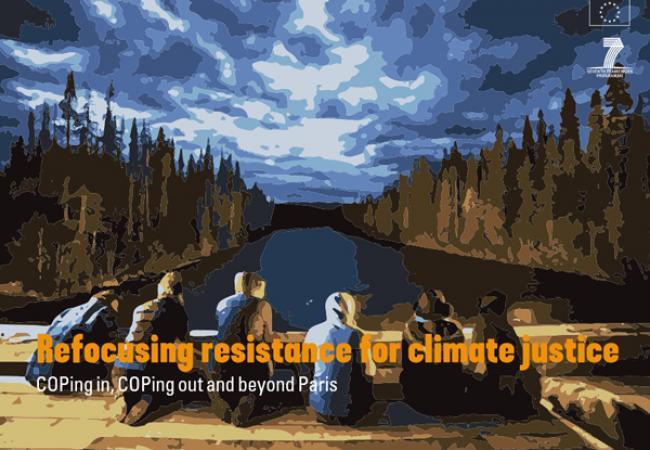Articles Menu

EJOLT, Environmental Justice Organizations, Liabilites and Trade, 29/09/15
PLEASE DISTRIBUTE WIDELY - APOLOGIES FOR CROSS POSTING
In the run-up to the UNFCCC COP 21 in Paris set for December, the EJOLT team is happy to announce the 23rd EJOLT Report dedicated to widening the discussion on climate justice, “Refocusing resistance for climate justice: COPing in, COPing out and beyond Paris”.
The conference objective is in theory to achieve a legally binding and universal agreement on against climate change, from all the nations of the world. Within the United National Framework Convention on Climate Change (UNFCCC) climate negotiations however, controversial schemes to supposedly protect the Earth’s climate eclipse the urgent need to reduce emissions at source and phase out fossil fuels. This report aims to send a strong message, that far from believing the UN can save the world’s climate, resistance to global climate injustice and inequality is alive and building from the ground up.
This report includes 13 articles from critical climate justice thinkers from around the world that: Explore how activists are organizing towards Paris to confront the powers ignoring the popular call to take action on climate change; take a broader perspective by examining emerging discourses and alliances within the climate justice movements; and finally trace some of the ongoing resistances of those living alongside exploitative projects from forest-grabbers to pipelines.
The report is accompanied by an EJOLT produced video from the Unis´tot´en camp in North-Western British Colombia showing how the successful camp is stopping up to seven oil and gas pipelines, holding up billions in investment and keeping millions of barrels (and cubic metres) of fossil fuels under the ground.
EJOLT Report 23: Refocusing resistance for climate justice. COPing in, COPing out and beyond Paris
The full report can be downloaded here.
Abstract
The climate and environmental justice debates are heating up ahead of the United Nations Climate Change Conference, COP21, scheduled for December this year in Paris. In theory, the conference objective is to achieve a legally binding and universal agreement on climate change, from all the nations of the world.
However, within the United Nations Framework Convention on Climate Change (UNFCCC), controversial schemes to supposedly protect the Earth’s climate eclipse the urgent need to reduce emissions at source and phase out fossil fuels.
This report firstly lays out how activists are organizing towards Paris to confront the powers that are ignoring the popular mandate for taking serious action on climate change. In the second section, we take a broader perspective examining important and emerging discourses and alliances within the Climate Justice movement. Finally in the 3rd section we focus on the ongoing resistance of those living alongside exploitative projects – from forest-grabbers to pipelines – and who are the most powerful force for keeping fossil fuels under the ground.
In Paris, there is no hope that the official conference will put on the table the Climate and ecological Debt owed from the wealthy to those who are being dispossessed. Yet in the streets and across the world, a decentralized movement of “Blockadia” is opposing fracking, pipelines, false solutions and dirty coal, racking up victories and gaining strength. This report aims to send a strong message, that far from believing the UN can save the world’s climate, resistance to global climate injustice and inequality is alive and building from the ground up.
Separate chapters are also available:
Abstract & Table of Contents
Introduction (Leah Temper and Tamra Gilbertson)
Chapter 1 – To COP in or out? Climate politics 21 cops in
1. Challenges for the climate justice movement: connecting dots, linking Blockadia and jumping scale (Patrick Bond)
2. The anti-politics of the Green Climate Fund: what is left to negotiate? (Sarah Bracking)
3. Having the last word: towards Paris2015 – challenges and perspectives (Maxime Combes)
4. Hacking the COP:. The Climate Games in Paris 2015 (The Laboratory of Insurrectionary Imagination)
Chapter 2 – Strategic discourses and alliances
5. Climate justice: two approaches (Joan Martínez-Alier)
6. The common(s) denominator: oil and water on a common river (Kevin Buckland)
7. Labour and climate change: towards an emancipatory ecological class consciousness (Stefania Barca)
8. Energy sovereignty: politicising an energy transition (Pere Ariza-Montobbio)
9. Desertec: the renewable energy grab? (Hamza Hamouchene)
Chapter 3 – Resistance to extractivism: stemming the flow
10. Women from KwaZulu-Natal’s mining war zone stand their ground against big coal (Faith ka-Manzi and Patrick Bond)
11. Leave the bones of Mother Earth in place: the liabilities left behind from Colombian coal exports (Andrea Cardoso)
12. Not one more well!: corruption and Brazil’s pre-salt expansion (Marcelo Calazans, Tamra Gilbertson and Daniela Meirelles)
13. Fracking as environmental load displacement: examining the violence of unconventional oil and gas extraction (Lena Weber)
14. Decolonising and decarbonising: How the Unist’ot’en are arresting pipelines and asserting autonomy (Leah Temper and Sam Bliss)
Editors
Leah Temper
Tamra Gilbertson
Contributors
Pere Ariza-Montobbio - FLACSO
Stefania Barca – University of Coimbra
Sam Bliss – Activist and writer
Patrick Bond – Universities of KwaZulu-Natal and of the Witwatersrand
Sarah Bracking - University of Manchester
Kevin Buckland – 350.org
Marcelo Calazans – FASE-ES, Brazil
Andrea Cardoso – ICTA, UAB
Maxime Combes – Attac, France
Tamra Gilbertson – Carbon Trade Watch
Hamza Hamouchene – Algeria Solidarity Campaign
Faith ka-Manzi – University of KwaZulu-Natal
Joan Martinez-Alier – ICTA, UAB
Daniela Meirelles – FASE-ES, Brazil
Leah Temper – ICTA, UAB
Lena Weber – Lund University